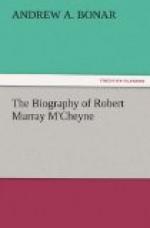fields cutting and bringing in their barley.
They reap with the hook as we do. They seem to
carry in at the same time upon camels. No vines
in Eshcol now, no pomegranates, but some green
fig-trees. Crossed the brook Sorek—dry.
Spent the mid-day under the embowering shade of a
fig-tree; tasted the apricots of the good land.
Same evening we came to Doulis, which we take to
be Eshtaol, where Samson was born. 6.—We
went due east, and, after a mountain pass, saw the
hills of Judah,—an immense plain intervening,
all studded with little towns. From their
names, we found out many Bible spots. This
valley or plain is the very vale Zephatha, of which
you read in II Chron. 14., ‘In the plain
of Sephela.’ Before night we entered
among the hills of Judah,—very like our
own Highlands,—and slept all night among
the mountains, at a deserted village called Latroon.
7.—One of the most privileged days of
our life. We broke up our tents by moonlight;
soon the sun was up; we entered a defile of the
most romantic character; wild rocks and verdant
hills; wild-flowers of every color and fragrance
scented our path. Sometimes we came upon a clump
of beautiful olive-trees, then wild again.
The turtle’s voice was heard in the land,
and singing birds of sweetest note. Our camels
carried us up this pass for four hours; and our
turbaned Bedouins added by their strange figures
to the scene. The terracing of all the hills
is the most remarkable feature of Judean scenery.
Every foot of the rockiest mountains may in this
way be covered with vines. We thought of Isaiah
wandering here, and David and Solomon. Still
all was wilderness. The hand of man had been
actively employed upon every mountain, but where
were these laborers now? Judah is gone into
captivity before the enemy. There are few
men left in the land; not a vine is there. ’The
vine languisheth.’ We came down upon
Garieh, a village embosomed in figs and pomegranates.
Ascending again, we came down into the valley of
Elah, where David slew Goliath. Another long and
steep ascent of a most rugged hill brought us into
a strange scene—a desert of sunburnt
rocks. I had read of this, and knew that Jerusalem
was near. I left my camel and went before, hurrying
over the burning rocks. In about half an hour
Jerusalem came in sight. ‘How doth the
city sit solitary that was full of people!’
Is this the perfection of beauty? ’How
hath the Lord covered the daughter of Zion with
a cloud in his anger!’ It is, indeed, very desolate.
Read the two first chapters of Lamentations, and you
have a vivid picture of our first sight of Jerusalem.
We lighted off our camels within the Jaffa gate.
Among those that crowded round us, we observed
several Jews. I think I had better not attempt
to tell you about Jerusalem. There is so much
to describe, and I know not where to begin.
The Consul, Mr. Young, received us most kindly,
provided us a house where we might spread our mats,
and helped us in every way. Mr. Nicolayson called




